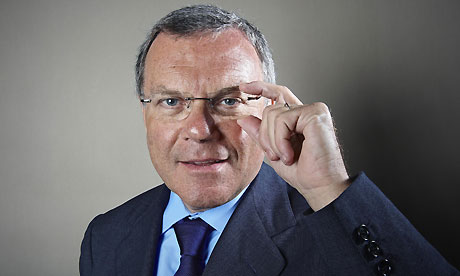Jeffrey Rosen, WPP's remuneration chairman, is expected to argue that Sir Martin Sorrell - who took home £13m in 2011 - has not had a salary rise since 2007 and needs to be paid fairly


WPP boss Sir Martin Sorrell. Photograph: Micha Theiner/City AM/Rex
Jeffrey Rosen, chairman of the remuneration committee at WPP, is to embark on a series of meetings with investors in an attempt to head off a row over a 30% pay rise for chief executive Sir Martin Sorrell.
Even before the current wave of shareholder activism - dubbed the "shareholder spring" - WPP was forced to rethink the scale of the pay rise for Sorrell, who founded the firm more than 25 years ago. In the autumn, WPP presented a plan to shareholders to hand Sorrell - already on a basic salary of £1m a year - a 50% pay rise but this was scaled back to 30% when the annual report was published last month.
Rosen, a New York-based investment banker, is expected to argue that Sorrell - who took home £13m in 2011 - has not had a salary rise since 2007 and needs to be paid fairly. He is also likely to argue that WPP has outperformed its peers over one, five and 10 years.
Shareholders in WPP do not need to decide how to vote on the remuneration report for a number of weeks as the annual meeting is on 13 June. They are expected to give Rosen a chance to deliver his views before taking a final position. Rosen, though, is likely to be hoping to avoid a scenario similar to last year when more than 40% of shareholders rejected the remuneration report.
A spokesman for WPP confirmed meetings were taking place. "WPP always holds meetings with shareholders following the publication of the annual report and has always encouraged shareholder communication," a WPP spokesman said.
The meetings come as investors are lodging protests at a wide-range of companies from Barclays, to Premier Food and insurance company Aviva where the remuneration report was voted down, sparking thedeparture of chief executive Andrew Moss yesterday. Moss was the third chief executive to bow out in recent weeks under shareholder pressure, as Astra Zeneca's David Brennan and Trinty Mirror's Sly Bailey also announced plans to leave. Trinity Mirror's annual meeting is on Thursday and is the latest in a string of annual meetings that traditionally take place between April and June.
At the Unilever annual meeting on Wednesday, there was a vote of more than 10% against the re-election of Paul Walsh, a non-executive director who is also chief executive of Diageo. Just 9.3% failed to back the pay plans of the Marmite-to-Dove company. Private shareholder Brian Hutchings, who was at the Unilever AGM and voted against the 6% pay rise for chief executive Paul Polman, said he believed major shareholders had been appeased beforehand. Hutchings said: "They've seen what's happened elsewhere and taken care to watch their backs with institutional shareholders."
After the tumultuous annual meeting at Barclays earlier this month, investors in Standard Chartered appeared to be more concerned with the bank's sponsorship of Liverpool football club than remuneration at its annual meeting where 10% of investors failed to back the pay plans. But there was a protest against non-executive Rudy Markham, a former Unilever finance director, who endured a 20% vote against his re-election to the Standard Chartered board as he has served more than nine years and is no longer regarded as independent under shareholder guidelines.
Manufacturing company Melrose also held its annual meeting on Wednesday and suffered a protest vote against its auditors, Deloitte, when almost 30% of investors failed to back their reappointment.

No comments:
Post a Comment